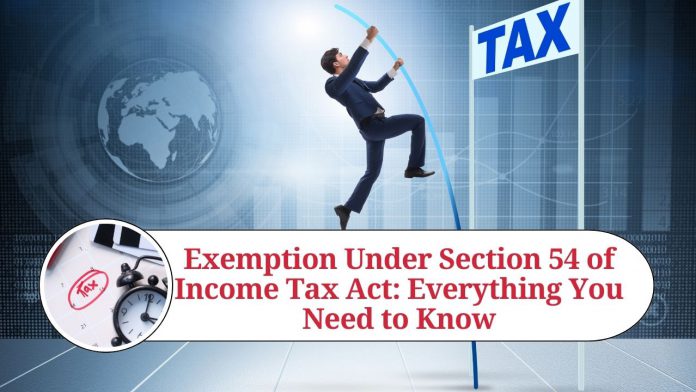When you sell a property, the income you earn from it is subject to taxation. However, the Income Tax Act provides several exemptions to reduce your tax burden. One such exemption is under Section 54 of the Income Tax Act. In this blog, we will discuss everything you need to know about the exemption under Section 54 of the Income Tax Act.
What is Section 54 of Income Tax Act?
Section 54 of the Income Tax Act provides an exemption to individuals who sell a residential property and purchase another residential property within a specified period. This exemption is available to individuals and Hindu Undivided Families (HUFs) who sell their residential property and purchase another residential property within a specified period. The exemption is available only for long-term capital gains.
What are long-term capital gains?
Long-term capital gains (LTCG) arise when you sell a property after holding it for more than two years. In case you sell the property before two years, the gains are treated as short-term capital gains (STCG). LTCG is taxed at a lower rate than STCG.
How to claim the exemption under Section 54 of the Income Tax Act?
To claim the exemption under Section 54 of the Income Tax Act, you need to meet the following conditions:
- The exemption is available only for long-term capital gains.
- The property sold should be a residential property.
- The property purchased should be a residential property.
- The property purchased should be situated in India.
- The property should be purchased either one year before the sale of the property or within two years from the sale of the property.
- In case you are constructing a new residential property, it should be completed within three years from the sale of the property.
- The amount of capital gains should be invested in the purchase or construction of the new property.
What is the amount of exemption under Section 54 of the Income Tax Act?
The amount of exemption under Section 54 of the Income Tax Act depends on the amount invested in the new property. If the amount invested is less than the amount of capital gains, the exemption is available only for the amount invested. If the amount invested is more than the amount of capital gains, the entire amount of capital gains is exempted from taxation.
Conclusion
Exemption under Section 54 of the Income Tax Act is a useful tool to reduce your tax burden while selling a residential property. However, it is essential to understand the conditions and requirements of the exemption before claiming it. If you are planning to sell your residential property, it is advisable to consult a tax expert to ensure that you comply with all the provisions of the Income Tax Act.
Read more useful content:
- section 234e of income tax act
- section 286 of income tax act
- section 90a of income tax act
- section 40a(7) of income tax act
- section 226(3) of income tax act
- section 24 of income tax act
Frequently Asked Questions (FAQs)
Q. What is Section 54 of the Income Tax Act?
Section 54 of the Income Tax Act provides an exemption to individuals who sell a residential property and purchase another residential property within a specified period.
Q. Who is eligible for exemption under Section 54 of the Income Tax Act?
Individuals and Hindu Undivided Families (HUFs) who sell their residential property and purchase another residential property within a specified period are eligible for the exemption.
Q. What type of capital gains are eligible for exemption under Section 54 of the Income Tax Act?
The exemption is available only for long-term capital gains (LTCG).
Q. What is the time limit to purchase a new residential property under Section 54 of the Income Tax Act?
The property should be purchased either one year before the sale of the property or within two years from the sale of the property.
Q. Is the exemption available if the property purchased is situated outside India?
No, the property purchased should be situated in India.
Q. Is the exemption available for the sale of commercial property?
No, the exemption is available only for the sale of a residential property.
Q. Can I claim the exemption if I construct a new residential property?
Yes, the exemption is available for the construction of a new residential property, provided it is completed within three years from the sale of the property.
Q. What is the amount of exemption under Section 54 of the Income Tax Act?
The amount of exemption under Section 54 of the Income Tax Act depends on the amount invested in the new property. If the amount invested is less than the amount of capital gains, the exemption is available only for the amount invested. If the amount invested is more than the amount of capital gains, the entire amount of capital gains is exempted from taxation.
Q. Do I need to file any documents to claim the exemption under Section 54 of the Income Tax Act?
Yes, you need to file Form 1-ITR and provide the details of the sale and purchase of the properties to claim the exemption.
Q. Can I claim the exemption if I have multiple properties?
The exemption is available for the sale of only one residential property. If you sell more than one residential property, the exemption is available only for the property with the highest LTCG.




















